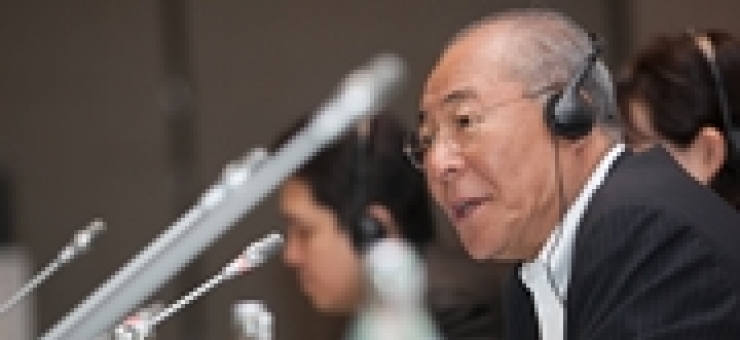News
UNI Apro ICTS Paves the Way to a Digital World

|
The 4th UNI Apro ICTS Sector Conference was held in Bangkok on 29 August 2013 with 117 participants from 15 countries. It also participated by union leaders from Telenor in the Asia Pacific region such as DIGI Malaysia, DTAC Thailand and Grameenphone Bangladesh. Kun Wardana Abyoto, Director of UNI Apro ICTS, highlighted the change of the sector name from Telecom to ICTS due to the merger between Telecom and IBITS sector which officially declared during the Inaugural of UNI ICTS Global Union Conference in Mexico on 20-21 October 2011. Fransisco Hernandez Juarez, World President of UNI ICTS, gave a solidarity greeting at the event, emphasizing the importance of organizing workers as the only way to ensure workers’ rights and to improve their living standards and better work conditions. Christopher Ng, Regional Secretary of UNI Apro, stressed the importance of organizing potential membership in this region. He said that organizing is not only the accumulation of numbers but also the accumulation of the influence in various forms. The work of organizing should be able to have impact to enable the union as the integrated part upon the enterprise and the industry. This is the way to make them treasure the union as a partner. “We are beyond organizing,” said Christopher. “UNI Apro will continue to provide support for ICTS sector to grow in influence and strength,” he added. Tomoyasu Kato, President of UNI Apro ICTS, gave an inspirational speech. He motivated participants to “stand up and take action for secure employment.” Secure employment has been an issue as non-regular workers are increasingly hired in this region. In addition, the emergence of new ICTS services and new technology innovation has made it even more challenging for unions. “We should organize workers in our sector, expand the organization, recruit more members, secure stable employment, better working conditions and decent work for all workers in ICTS sector,” said President Kato. He also pointed out the importance to organize the ICTS employees in Myanmar, where UNI does not have any members. Philip Jennings, General Secretary of UNI Global Union, said that workers in the Asia Pacific region are not treated fairly at work. “The ICTS sector is evolving and has revolutionized everything. Yet inequality in this region is on the rise,” said Philip, “Workers need to receive fair and just jobs. The breaking through strategy should aim at growing unions, building relationships with employer, freeing workers from distressed environments, enabling equality on the job, giving young people a voice, and influencing regulations.” “UNI Apro ICTS Breaking Through strategy has paved the way to a digital world,” Kun Wardana Abyoto said during his presentation on UNI Apro ICTS achievements for the last four years. ICTS union presence can now be felt in Malaysia (Digi Telecommunications), Thailand (DTAC) and Bangladesh (Grameen Phone) after more than a year’s hard work in attempting to form unions in the respective companies. The conclusion of the Telenor-UNI Global Agreement on 18 January 2013 has brought down some levels of employers’ resistance in the respective national management. “Even there are still challenges, but we are confident by having more regular social dialogue the amicable settlement in those countries can be achieved,” Kun added. Another breakthrough is the Global Framework Agreement with Telkom Indonesia, the biggest telecom operator in the most populated country in South East Asia.  In Cambodia, the first ICTS union has been organised. “President Kato has inspired us to open the door and establish Smart Mobile Union,” Kun said. Smart Mobile Union is also linked to Ncell Union in Nepal where both are subsidiaries of Teliasonera. Ncell Union has been established earlier and it now has a strong presence with almost 100% union density and is covered by collective agreement. The broadband deployments of ICTS infrastructure are varied among countries in Asia. Four countries namely, Japan, Singapore, Sri Lanka and Indonesia shared their experiences in coping with the challenges and its impact on ICTS employees. They agreed that the trends are the same regarding carriers’ competition, growing of smart phone, more cloud services, new job opportunities and more atypical workers. Unions need to constantly confront these changes. Research on how to improve working conditions, up skilling, job training, measures to secure the employment, organizing temporary/contract workers, and influencing governments for pro-workers’ policies are some solutions identified in protecting the workers.  The conference also heard success stories in organizing and expanding their union membership from various countries in Asia Pacific where all sub regions are represented like Japan, Malaysia, Philippines, India, Nepal and Fiji Conference unanimously agreed on an action plan for the continual support towards organizing in Telenor and Teliasonera subsidiaries in Asia Pacific. Other large potential memberships of multinational companies in the ICTS sector in the region are also targeted. The key elements include promoting social dialogue and developing organizing campaigns particularly to mobile telecom employees, call center workers, IT Workers and Professional and Managers (P&M) in the ICTS Sector. The conference also agreed to develop creative organizing strategy directed at women, youth and the flexible work force in the ICTS sector such has part-time workers, agency workers and contractual workers. Bro Minao Noda, President of ICTJ Japan was elected unanimously at the conference as President of UNI Apro ICTS. |
 |

